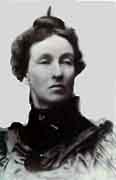Newly retired after teaching 35 years at Crowder College in Neosho, Wallace currently serves as tribal secretary to the Eastern Shawnee. Her presentation as Mary Elizabeth Lease was part of the Heartland Chautauqua program presented by the Missouri Humanities Council this past summer at the George Washington Carver National Monument although Lease herself once had taken issue with the phrase "America, the Bountiful," the theme of the MHC Heartland Chautauqua in 2005 and 2006.

Mary Elizabeth Clyens Lease (1853-1933) American lecturer, writer, and Populist Party political activist, who championed diverse public cases including the plight of the farmer, was born of Irish immigrant parents in Ridgway, Pennsylvania. At the age of twenty she came to Kansas to teach school in Osage Mission, and three years later she married Charles L. Lease, a local pharmacist.
She and her husband spent 10 years trying to make a living farming, but lost everything in the financial panic of 1873, which was anything but a "bountiful" time or experience. She later became the voice of the Farmers' Alliance, making more than 160 speeches in the Populist Party's 1890 campaign in which she claimed credit for the defeat of Kansas senator John Ingalls.
Achieving world-wide fame and attracting national attention, Lease has been described by her enemies as using "radical utterances." The most famous quotation attributed to her by a newspaper staff member, which she denies having ever said, supposedly encouraged farmers of Kansas to "raise less corn and more hell." Lease didn't make a big issue of the misquoted comment because she believed it to be "a right good piece of advice."
Always known for her powerful voice, both physically and influentially, she has been described as hurling sentences "as Jove hurled thunderbolts." Her detractors referred to her as Mary Ellen Lease or "Mary Yellin" whereas her supporters referenced her as Queen Mary. While simultaneously being accused of being a "virago" and "petticoated smut-mill," Lease was known to be able to influence hundreds of votes wherever she spoke, convincing the opposition not to want her in their area near or during election time. As one source stated, regardless of whether Mary Elizabeth Lease did or did not explicitly call for more" hell raising, Lease was a powerful voice of the agrarian crusade."
Lease, who was admitted to the Kansas bar in 1885, visited Carthage several times including 1891 when she spoke for the Farmers' Alliance and again in 1897 as part of Suffrage Day at the Interstate Chautauqua Assembly that summer. Her marriage fell apart about 5 years later.
For more information on the program, please contact the Powers Museum at (417) 358-2667 (Tues. - Sat. 11 a.m. to 4:30 p.m.) or send an email.






Comments